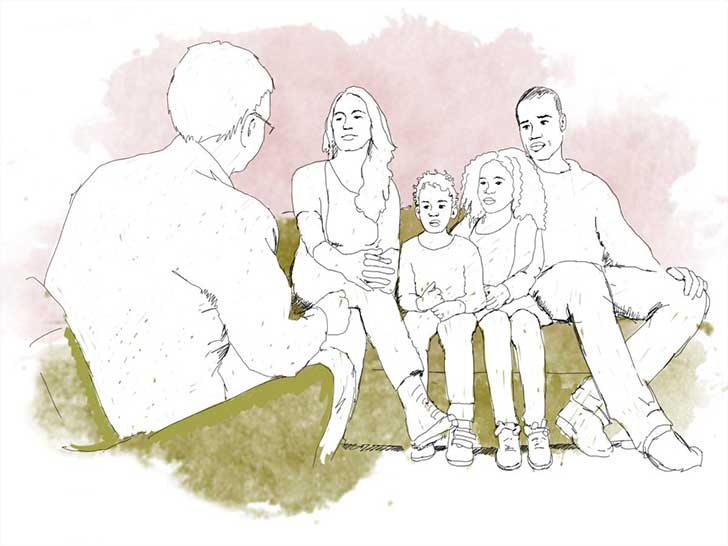اخبار روانشناسی ندای مهر
|
||
|
A. Attitudes Towards Women Scale (Spence‚ Helmrich & Stapp‚ 1978) – Short version
Instructions: The statements listed below describe attitudes toward the roles of women in society which different people have. There are no right or wrong answers‚ only opinions. You are asked to express your feeling about each statement by indicating whether you (A) agree strongly‚ (B) agree mildly‚ (C) disagree mildly‚ or (D) disagree strongly.
1. Swearing and obscenity are more repulsive in the speech of a woman than of a man.
A B C D
Agree strongly Agree mildly Disagree mildly Disagree strongly
2* Women should take increasing responsibility for leadership in solving the intellectual and social problems of the day.
A B C D
Agree strongly Agree mildly Disagree mildly Disagree strongly
3.* Both husband and wife should be allowed the same grounds for divorce.
A B C D
Agree strongly Agree mildly Disagree mildly Disagree strongly
4. Telling dirty jokes should be mostly a masculine prerogative.
A B C D
Agree strongly Agree mildly Disagree mildly Disagree strongly
5. Intoxication among women is worse than intoxication among men.
A B C D
Agree strongly Agree mildly Disagree mildly Disagree strongly
6.* Under modern economic conditions with women being active outside the home‚ men should share in household tasks such as washing dishes and doing the laundry.
A B C D
Agree strongly Agree mildly Disagree mildly Disagree strongly
7.* It is insulting to women to have the "obey" clause remain in the marriage service.
A B C D
Agree strongly Agree mildly Disagree mildly Disagree strongly
8.* There should be a strict merit system in job appointment and promotion without regard to sex.
A B C D
Agree strongly Agree mildly Disagree mildly Disagree strongly
9.* A woman should be free as a man to propose marriage.
A B C D
Agree strongly Agree mildly Disagree mildly Disagree strongly
10. Women should worry less about their rights and more about becoming good wives and mothers.
A B C D
Agree strongly Agree mildly Disagree mildly Disagree strongly
11.* Women earning as much as their dates should bear equally the expense when they go out together.
A B C D
Agree strongly Agree mildly Disagree mildly Disagree strongly
12.* Women should assume their rightful place in business and all the professions along with men.
A B C D
Agree strongly Agree mildly Disagree mildly Disagree strongly
13. A woman should not expect to go to exactly the same places or to have quite the same freedom of action as a man.
A B C D
Agree strongly Agree mildly Disagree mildly Disagree strongly
14. Sons in a family should be given more encouragement to go to college than daughters.
A B C D
Agree strongly Agree mildly Disagree mildly Disagree strongly
15. It is ridiculous for a woman to run a locomotive and for a man to darn socks.
A B C D
Agree strongly Agree mildly Disagree mildly Disagree strongly
16. In general‚ the father should have greater authority than the mother in the bringing up of children.
A B C D
Agree strongly Agree mildly Disagree mildly Disagree strongly
17. Women should be encouraged not to become sexually intimate with anyone before marriage‚ even their fiancés.
A B C D
Agree strongly Agree mildly Disagree mildly Disagree strongly
18.* The husband should not be favored by law over the wife in the disposal of family property or income.
A B C D
Agree strongly Agree mildly Disagree mildly Disagree strongly
19. Women should be concerned with their duties of childbearing and house tending rather than with desires for professional or business careers.
A B C D
Agree strongly Agree mildly Disagree mildly Disagree strongly
20. The intellectual leadership of a community should be largely in the hands of men.
A B C D
Agree strongly Agree mildly Disagree mildly Disagree strongly
21.* Economic and social freedom is worth far more to women than acceptance of the ideal of femininity which has been set up by men.
A B C D
Agree strongly Agree mildly Disagree mildly Disagree strongly
22. On the average‚ women should be regarded as less capable of contributing to economic production than are men.
A B C D
Agree strongly Agree mildly Disagree mildly Disagree strongly
23. There are many jobs in which men should be given preference over women in being hired or promoted.
A B C D
Agree strongly Agree mildly Disagree mildly Disagree strongly
24.* Women should be given equal opportunity with men for apprenticeship in the various trades.
A B C D
Agree strongly Agree mildly Disagree mildly Disagree strongly
25.* The modern girl is entitled to the same freedom from regulation and control that is given to the modern boy.
A B C D
Agree strongly Agree mildly Disagree mildly Disagree strongly
In scoring the items‚ A=0‚ B=1‚ C=2‚ and D=3 except for the items with an asterisk where the scale is reversed. A high score indicates a profeminist‚ egalitarian attitude while a low score indicates a traditional‚ conservative attitude.
B. References:
Spence‚ J.T.‚ Helmreich‚ R.‚ & Stapp‚ J. (1973). A short version of the Attitudes toward Women Scale (AWS). Bulletin of the Psychonomic Society‚ 2‚ 219-220.
Spence‚ J.T. & Helmreich‚ R.L. (1978). Masculinity and femininity: Their psychological dimensions‚ correlates‚ and antecedents. Austin‚ TX: University o
|
Circle the number that best reflects your degree of agreement or disagreement with each statement. 1. Obedience and respect for authority are the most important virtues children should learn. Strongly Somewhat Slightly Slightly Somewhat Strongly 2.* What we need least is an authority to tell us what to do or how to do it. Strongly Somewhat Slightly Slightly Somewhat Strongly 3. Every person should have complete faith in some supernatural power whose decisions he obeys without question. Strongly Somewhat Slightly Slightly Somewhat Strongly 4. People can be divided into two distinct classes‚ the weak and the strong. Strongly Somewhat Slightly Slightly Somewhat Strongly 5.* To be a decent human being‚ follow your conscience regardless of the law. Strongly Somewhat Slightly Slightly Somewhat Strongly 6.* No principle is more immoral than that of obedience. Strongly Somewhat Slightly Slightly Somewhat Strongly Strongly Somewhat Slightly Slightly Somewhat Strongly 8.* Astrology will never explain anything because it is a fraud. Strongly Somewhat Slightly Slightly Somewhat Strongly 9.* The Canadian way of life is so resistant to progress that a revolution is necessary to end its injustices and oppressions. Strongly Somewhat Slightly Slightly Somewhat Strongly 10. Nowadays‚ when so many different kinds of people move around and mix together so much‚ a person has to protect himself against catching an infection or disease from them. Strongly Somewhat Slightly Slightly Somewhat Strongly 11.* Children don=t owe their parents a thing. Strongly Somewhat Slightly Slightly Somewhat Strongly 12.* Canada can=t exert moral leadership among nations until it abandons its corrupt material nature. Strongly Somewhat Slightly Slightly Somewhat Strongly 13.* Sex crimes like rape and child molesting reflect a sick society and we must change society rather than punish individual offenders. Strongly Somewhat Slightly Slightly Somewhat Strongly 14. Obedience is the mother of success. 15. Strong discipline builds moral character. Strongly Somewhat Slightly Slightly Somewhat Strongly 16. Canada is spiritually predestined to lead the world. Strongly Somewhat Slightly Slightly Somewhat Strongly 17. Some day it will probably be shown that astrology can explain a lot of things. Strongly Somewhat Slightly Slightly Somewhat Strongly 18.* Peoples of different nationalities‚ social classes and races should mix together more. Everybody would benefit from it. Strongly Somewhat Slightly Slightly Somewhat Strongly 19.* To know people well is to love them. Strongly Somewhat Slightly Slightly Somewhat Strongly 20. The true Canadian way of life is disappearing so fast that force may be necessary to preserve it. Strongly Somewhat Slightly Slightly Somewhat Strongly 21. Sex crimes‚ such as rape and attacks on children‚ deserve more than mere punishment: Such criminals ought to be publicly whipped or worse. Strongly Somewhat Slightly Slightly Somewhat Strongly 22.* Obedience is the mother of enslavement. Strongly Somewhat Slightly Slightly Somewhat Strongly 23.* True morality only develops in a fully permissive environment. Strongly Somewhat Slightly Slightly Somewhat Strongly 24. There is hardly anything lower than a person who does not feel a great deal of love‚ gratitude‚ and respect for his parents. Strongly Somewhat Slightly Slightly Somewhat Strongly 25. No principle is more noble or holy than that of true obedience. Strongly Somewhat Slightly Slightly Somewhat Strongly 26.* The strong and the weak are not inherently different. They are merely the advantaged and the disadvantaged members of an unfair society. Strongly Somewhat Slightly Slightly Somewhat Strongly 27.* Obedience and respect for authority aren=t virtues and shouldn=t be taught to children. Strongly Somewhat Slightly Slightly Somewhat Strongly 28. To be a decent person‚ always stay within the law. Strongly Somewhat Slightly Slightly Somewhat Strongly 29. Our chief want in life is somebody to make us do what we should. Strongly Somewhat Slightly Slightly Somewhat Strongly 30.* Faith in the supernatural is a harmful self-delusion‚ and submission to religious authority is dangerous. Strongly Somewhat Slightly Slightly Somewhat Strongly Note: Items marked with an asterisk are reverse-scored items. Kohn‚ P.M. (1972). The Authoritarianism-Rebellion scale: A balanced F Scale with left-wing reversals. Sociometry‚ 35‚ 176-189.
HOW DO YOU FEEL TODAY?
Which of these four faces reflects your mood?
Seeking to categorise the emotional basis of different personality types‚ the physiologist Wilhelm Max Wundt (1832-1920) took the classical theory of the four humours (temperaments sealed in the body) which defined the categories of the melancholic‚ the choleric‚ the sanguine and the phlegmatic. His refinements included vertical and horizontal axes from 'emotional' to 'non-emotional'. and 'unchangeable' to 'changeable'‚ and a colour coding that anticipates Luscher (See card 23 and 24). Although it is true that individuals have consistent personality tendencies‚ this classification of emotional types might also serve as a rudimentary guide to anybody's range of feelings over a given period of time. What you are like in the morning may not be what you are like in the evening.
Wundt set up the first research laboratory for experimental psychology at the University of Leipzig in 1875 and initiated a new science of the mind. In 1894 he established the Institute for Experimental Psychology at Leipzig. the first academic institute of its kind in the world.
EMOTIONAl
ANXIOUS WORRIED
CHANGEABLE
QUICKLY ROUSED
UNHAPPY SUSPICIOUS
THOUGHTFUL
UNCHANGEABLE
NONEMOTIONAl
The faces are reproduced from Physiognomische Fragmente by Johann Kaspar Lavater (1741-1801
|
||||||||||||||||||||||||||||||||||||||
|
|||||
|
|||||
|
|||||
HOW MANY OBJECTS?
This test is best administered by masking the card and successively uncovering from the top each row of three panels. Moving as fast as you can from top left to bottom right. say out loud how many objects there are in each panel.
You are likely to have made an error. hesitated or taken longer on reaching the last two panels. This is because the objects in each panel are Arabic numerals whose names and meaning are those of numerical quantities that differ from the actual number of objects displayed. The objects in the preceding panels are themselves irrelevant to the numerical quantity task. and are not. in fact. quite so easy to name as the Arabic numerals. They do not interfere with the task of saying the number as we do not have to make any special effort to ignore them. We are therefore unprepared to ignore the Arabic numerals when they occur. and when we see them their meaning is immediately understood and made available for speech. The principle at work here is similar to that in the Colour Naming tasks: our intention is to apprehend numerical quantity and say out loud the number of objects we see. and that is easy when we are presented with a small number of objects whose meaning is not in the domain of number. We apprehend immediately the quantity of up to five closely arrayed objects. When the objects whose number is to be stated are themselves numerals i.e. in the domain of number. we have to make a special effort to ignore them. and interference occurs at the level of speech. This demonstrates once more the difficulty we have in selectively attending to one aspect of a display and totally ignoring another aspect.
Freud was deeply interested in those speech errors that occur when what is produced is different from what was intended. seeing it as revelatory of what the speaker had in mind irrespective of the conscious intention to say something else. This was a central theme of his classic The Psychopathology of Everyday Life (1904). Research indicates. however. that many errors produced by speech processes might merely reflect an innocuous aspect of the nervous system as such.
|
||
|
Dissociative Experiences Scale
The Dissociative Experiences Scale (DES II)‚ the 1993 revised version (Carlson & Putnam‚ 1993) is a 28-item self report measure of the frequency of dissociative experiences. The change in the DES II (Carlson & Putnam‚ 1993) is considered to "be so minor that we feel confident that the new version will yield results comparable to those of the old version .
Note: This version of the DES‚ which is the one used most frequently in my laboratory‚ is essentially the same as the "DES II" provided by Carlson & Putnam (Dissociation‚ 1993)‚ with very minor changes to the wording of the instructions. The 11-point Likert-type response scale for the DES II is far more convenient than the 10-centimeter visual analogue scale of the original DES‚ especially for large-scale testing sessions.
Name:____________________ Student ID#:_____________
Telephone: ___________ Age:_______ Years Sex: ___Female ___Male
PERSONAL EXPERIENCES
This questionnaire consists of 28 questions about experiences that you may have in your daily life. We are interested in how often you have these experiences. It is important‚ however‚ that your answers show how often these experiences happen to you when you are not under the influence of alcohol or drugs.
To answer the questions‚ please determine to what degree the experience described in the question applies to you and indicate the percentage of the time you have the experience:
(Never) 0%----10----20----30----40----50----60----70----80----90----100% (Always)
_____01. Some people have the experience of driving or riding in a car or bus or subway and suddenly realizing that they don't remember Indicate what has happened during all or part of the trip. Indicate what percentage of the time this happens to you.
_____02. Some people find that sometimes they are listening to someone talk and they suddenly realize that they did not hear part or all of what was said. Indicate what percentage of the time this happens to you.
_____03. Some people have the experience of finding themselves in a place and having no idea how they got there. Indicate what percentage of the time this happens to you.
_____04. Some people have the experience of finding themselves dressed in clothes that they don't remember buying. Indicate what percentage of the time this happens to you.
_____05. Some people have the experience of finding new things among their belongings that they do not remember buying. Indicate what percentage of the time this happens to you.
_____06. Some people sometimes find that they are approached by people that they do not know who call them by another name or insist that they have met them before. Indicate what percentage of the time this happens to you.
_____07. Some people sometimes have the experience of feeling as though they are standing next to themselves or watching themselves do something and they actually see themselves as if they were looking at another person. Indicate what percentage of the time this happens to you.
_____08. Some people are told that they sometimes do not recognize friends or family members. Indicate what percentage of the time this happens to you.
_____09. Some people find that they have no memory for some important events in their lives (for example‚ a wedding or graduation). Indicate what percentage of the time this happens to you.
_____10. Some people have the experience of being accused of lying when they do not think that they have lied. Indicate what percentage of the time this happens to you.
_____11. Some people have the experience of looking in a mirror and not recognizing themselves. Indicate what percentage of the time this happens to you.
_____12. Some people have the experience of feeling that other people‚ objects‚ and the world around them are not real. Indicate what percentage of the time this happens to you.
_____13. Some people sometimes have the experience of feeling that their body does not seem to belong to them. Indicate what percentage of the time this happens to you.
_____14. Some people have the experience of sometimes remembering a past event so vividly that they feel as if they were reliving that event. Indicate what percentage of the time this happens to you.
_____15. Some people have the experience of not being sure whether things that they remember happening really did happen or whether they just dreamed them. Indicate what percentage of the time this happens to you.
_____16. Some people have the experience of being in a familiar place but finding it strange and unfamiliar. Indicate what percentage of the time this happens to you.
_____17. Some people find that when they are watching television or a movie they become so absorbed in the story that they are unaware of other events happening around them. Indicate what percentage of the time this happens to you.
_____18. Some people sometimes find that they become so involved in a fantasy or daydream that it feels as though it were really happening to them. Indicate what percentage of the time this happens to you.
_____19. Some people find that they sometimes are able to ignore pain. Indicate what percentage of the time this happens to you.
_____20. Some people find that they sometimes sit staring off into space‚ thinking of nothing‚ and are not aware of the passage of time. Indicate what percentage of the time this happens to you.
_____21. Some people sometimes find that when they are alone they talk out loud to themselves. Indicate what percentage of the time this happens to you.
_____22. Some people find that in one situation they may act so differently compared with another situation that they feel almost as if they were two different people. Indicate what percentage of the time this happens to you.
_____23. Some people sometimes find that in certain situations they are able to do things with amazing ease and spontaneity that would usually be difficult for them (for example‚ sports‚ work‚ social situations‚ etc.). Indicate what percentage of the time this happens to you.
_____24. Some people sometimes find that they cannot remember whether they have done something or have just thought about doing that thing (for example‚ not knowing whether they have just mailed a letter or have just thought about mailing it). Indicate what percentage of the time this happens to you.
_____25. Some people find evidence that they have done things that they do not remember doing. Indicate what percentage of the time this happens to you.
_____26. Some people sometimes find writings‚ drawings‚ or notes among their belongings that they must have done but cannot remember doing. Indicate what percentage of the time this happens to you.
_____27. Some people sometimes find that they hear voices inside their head that tell them to do things or comment on things that they are doing. Indicate what percentage of the time this happens to you.
_____28. Some people sometimes feel as if they are looking at the world through a fog so that people and objects appear far away or unclear. Indicate what percentage of the time this happens to you.
Bernstein‚ E. M.‚ & Putnam‚ F. W. (1986). Development‚ reliability‚ and validity of a dissociation scale. Journal of Nervous and Mental Disease‚ 174‚ 727– 735.
Carlson‚ E. B.‚ & Putnam‚ F. W. (1993). An update on the dissociative experiences scale. Dissociation‚ 6‚ 16–27.
|

-

مزیت های زندگی زوجین هردو شاغل چیست؟
کارشناس ندای مهر (مشاوره خانواده) -

چرا به مشاوره خانواده مراجعه کنیم و به وی پول بدهیم؟
کارشناس ندای مهر (مشاوره خانواده) -

رک گویی و بی پرده حرف زدن در خانواده خوب است یا بد؟
کارشناس ندای مهر (مشاوره خانواده) -

معجون معجزه آسا برای ایجاد صمیمیت بین همسران در خانواده
کارشناس ندای مهر (مشاوره خانواده) -

4 اخلاق خطرناک که رابطه شما و همسرتان را به سمت طلاق می برند
کارشناس ندای مهر (مشاوره خانواده)







